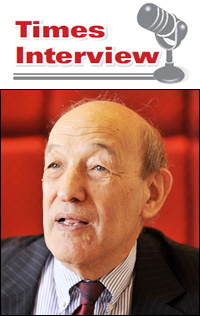Press Release

Japan’s stable civil sector, coupled with its cumulative experience of overcoming earthquakes, will allow the island country to rebuild its economy despite the latest devastating temblor, according to a Japan specialist.
Ezra F. Vogel, professor of emeritus at Harvard University, predicted that Japan will recover quickly based on these inner strengths. He also said that the quake and the subsequent monster tsunami will be unlikely to have a major impact on the economy in the long run.
“I don’t expect the earthquake will have much effect. If you look at the Kobe earthquake, Japanese rebuilt the economy quite quickly,” Vogel said Wednesday in an interview with The Korea Times at a Seoul hotel.
A 7.2-magnitude earthquake rocked Kobe for 20 seconds on Jan. 17, 1995, killing 5,100 people and destroying numerous buildings and facilities in the city.
Before March 11, the quake in Kobe was the worst in Japan since 1923 when the Great Kanto earthquake in Tokyo killed more than 140,000 people.
Vogel showed his attachment to Sendai, the devastated city located 130 kilometers east of the epicenter of the earthquake.
“When I was in Japan in the late 1950s, I spent three weeks in a fishing village in Sendai. (The earthquake) is such a terrible tragedy,” he said.
Before teaching students at Harvard, Professor Vogel had been in Japan from 1958 to 1960 as a research fellow.
Vogel was optimistic about Japan’s reconstruction of the northeastern region. “I think Japanese society has very strong organizations,” he said. “And even though they are a little bureaucratic and a little slow in responding, there are a lot of strengths in Japanese society.”
His remarks came amid speculation among observers in Seoul that the disaster could make it more difficult for Japan, which had grappled with economic woes and a donation scandal before the earthquake, to manage its economy due to the huge reconstruction cost.
But like Vogel, Western experts have presented a very different view.
Sebastian Mallaby, a Council on Foreign Relations expert, said in a recent interview that while production will fall in the short term, the Japanese economy will rebound quickly, driven by demand arising from reconstruction.
Mallaby estimated the cost of reconstruction at approximately $100 billion, saying it won’t have a significant macroeconomic impact on the Japanese economy.
Japanese Ambassador to Seoul Masatoshi Muto expressed a similar view in an interview with a local newspaper. He noted that factories and facilities, which were destroyed by the earthquake, are being dealt with faster than expected, raising hopes that reconstruction could help boost the hitherto sagging Japanese economy.
Citing China’s reaction to Japan over the so-called “lost decade,” Vogel hinted that what happened in Japan after the economic recession in the 1990s could offer a clue to Japan’s strengths.
“In Japan, there has been no (economic) growth for two decades practically. But there were no anti-government protests and the society showed no signs of instability,” he said. “The Chinese found it hard to understand what was going on in Japan,” he said.
Vogel pointed out a weak political leadership as a challenge facing Japan in the post-reconstruction era.
“In the short term, the Japanese need to rally around the leader (Prime Minister Naoto Kan). To change the leader right now would be very dangerous,” he said.
But he was skeptical about the prospects for Kan to keep his power long, noting that he has been under criticism over a donation scandal before the earthquake.
Professor Vogel left Seoul Thursday after wrapping up his week-long visit here at the invitation of the Seoul-based East Asia Institute.